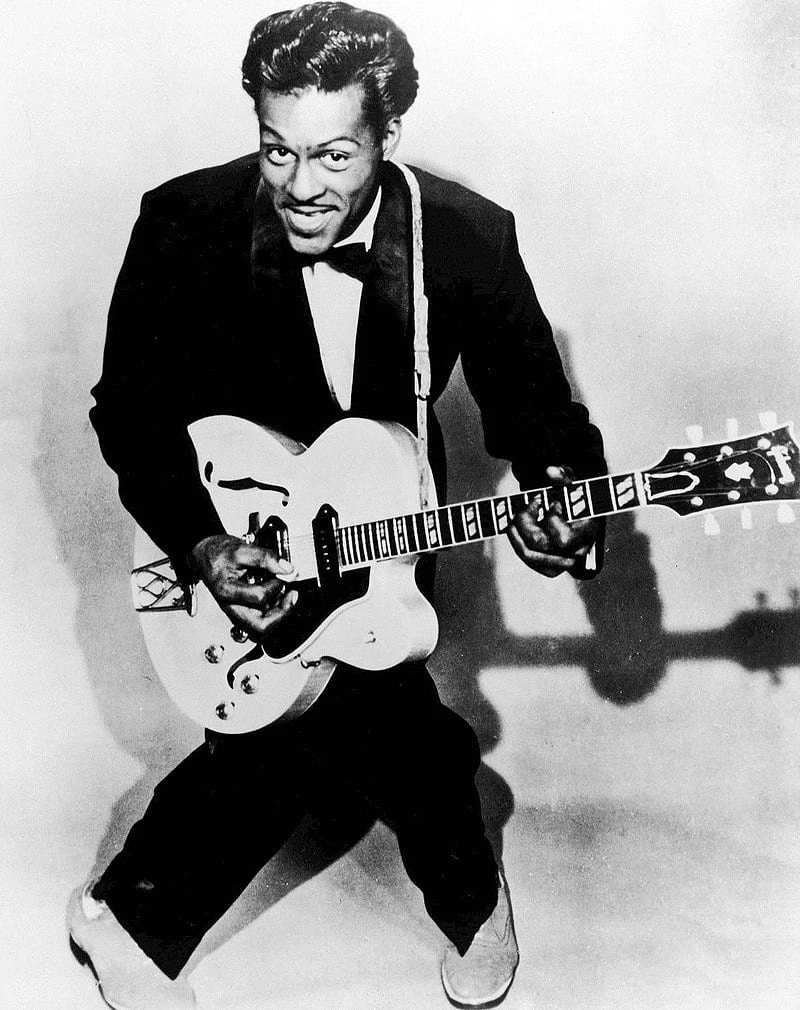Rolling Stone magazine ranked the first rock ’n’ roll guitarist and composer fifth in the list of the greatest artists of all time and all nations. Legendary peer John Lennon famously summed up his true value: “If you had to give rock ’n’ roll a name, it would be Chuck Berry.”
A Discordant Beginning
The future rock musician, songwriter, singer, and guitarist was born on October 18, 1926, in St. Louis, into a large African-American family of a Baptist church deacon. Music captivated the boy from childhood, and he gave his first concert in 1941 while still in school. However, just three years later, he and his friends got into trouble: they robbed several stores in Kansas and stole a car, for which the bad company landed him in prison for 10 years (his mother—the school principal—had overlooked her wayward son).
Yet even behind bars, the talented young man did not give up his passion: he formed a musical quartet. At age 21, he was released early.
After marrying and having a daughter, the responsible family man worked as a factory laborer and even as a cosmetologist. Eventually, he bought his first own three-room house—not very spacious, but made of brick.
To Everything, There Is a Season
Starting in the early ’50s, Chuck began performing with various bands in local clubs, initially playing country blues. His debut single, “Maybellene,” topped the American charts, selling a million copies—a record-breaking feat at the time. Soon after came the major hits that supported him throughout his life: “Roll Over Beethoven,” “Sweet Little Sixteen,” “Rock And Roll Music,” and “Johnny B. Goode.” But their author… ended up behind bars again.
In December 1959, Chuck Berry, who had a prior conviction, was arrested on charges related to a minor. For having sex with a club coat-check girl who was involved in prostitution, he faced up to five years in prison. After appeals, his sentence was reduced to one and a half years and a $5,000 fine (according to other sources, Berry was released early after serving three years behind bars).
Before going away, the musician managed to record another hit, “Come On,” and when he was released from prison in 1963, he was surprised by his own popularity. While he was incarcerated, his work gained widespread attention thanks to The Beatles and The Rolling Stones—the young members of the so-called “British Invasion” of the United States. Berry had a few fresh hits left to record (including “Nadine”) and then could rest on his laurels, earning big on tours.
The Price of Fame
His time in prison shattered the musician’s faith in human decency, and Chuck thereafter managed his concerts with shocking meticulousness: he not only refused to start performing without being paid upfront but would cut a song short if the paid time ran out. Rumors circulated about how “dramatically” Berry sometimes left the stage: checking his watch, falling silent mid-song, unplugging his guitar, and walking off backstage.

Chuck Berry, 1958
In 1979, the musician faced his third criminal case — this time charged with tax evasion. The court sentenced him to four months in prison and one thousand hours of community service.
Then, in 1990, several women accused Chuck Berry, who owned a club, of secretly installing surveillance cameras in the ladies’ restroom. The case never went to court: Berry reportedly settled by paying the plaintiffs $1.2 million. By that time, the musician was wealthy enough that no one dared to take advantage of him.
The author will forgive
At the peak of his talent, Chuck Berry didn’t even burden himself with a permanent band: he arranged for instrumental backing locally at each tour stop. He would arrive at a club alone and, an hour before the concert, recruit local musicians to perform with him. For these players, sharing the stage with a legendary artist was both a professional reward and an honor. Sheet music and rehearsals were unnecessary — who wouldn’t know his immortal compositions!

Chuck Berry at a concert, 2013 (Photo: DonClemente12F67)
At concerts, the prankster wearing a captain’s cap might mix up the lyrics of his own songs and, to the audience’s applause, brush it off with a joke: “The author will forgive!” And really, what difference does it make how or where he wrote them…
Over his long life, Chuck Berry created 51 compositions, one of which, thirty years later, was chosen by American director Quentin Tarantino as the main theme for the Oscar-winning film Pulp Fiction (1994). The unforgettable dance of Uma Thurman and John Travolta in the movie is set to Chuck Berry’s immortal 1964 hit, “You Never Can Tell.”
